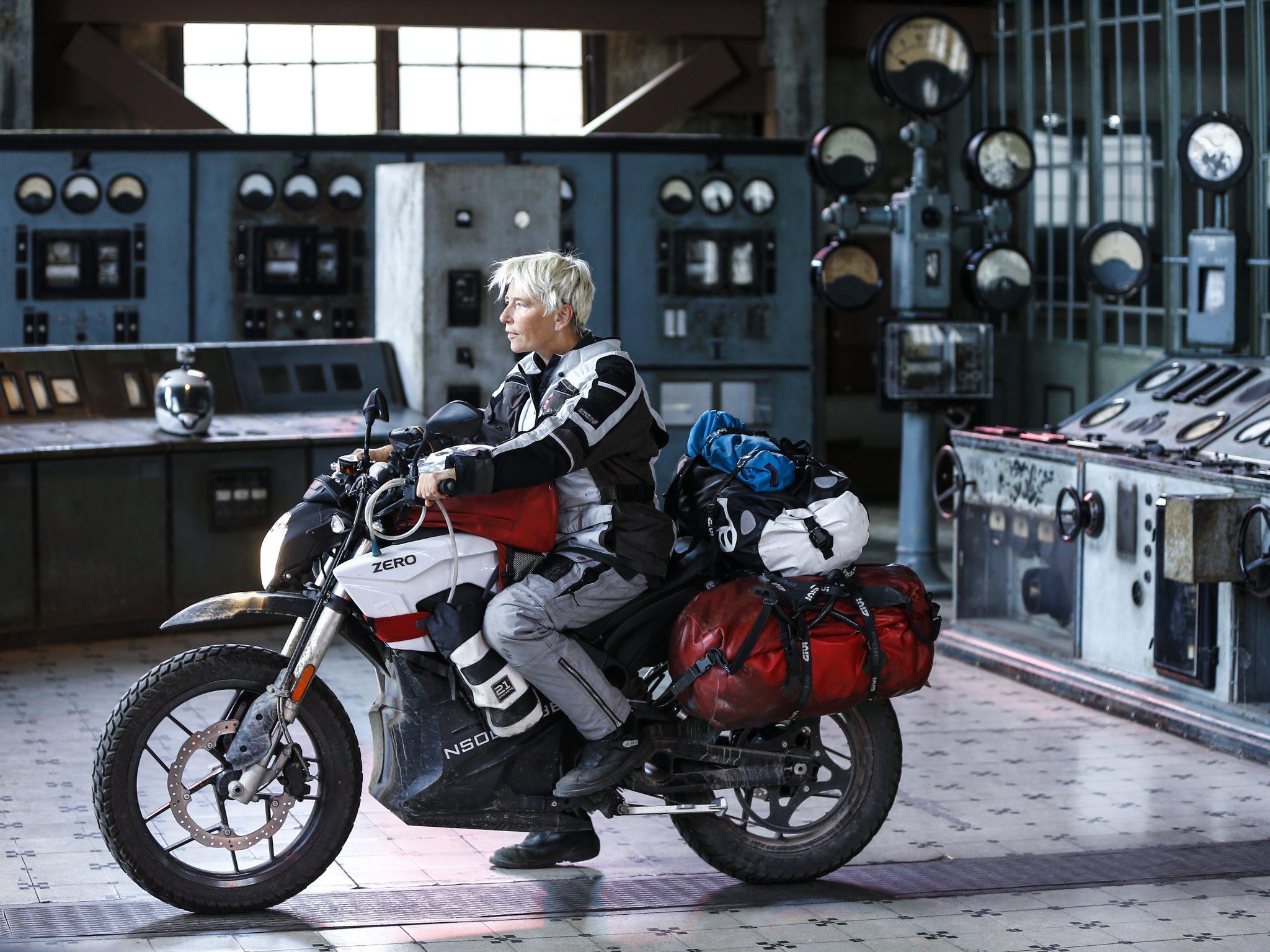
The Woman Behind the Elektrogirl
BY EGLE GERULAITYTE
Trui Hanoulle, aka the Elektrogirl, a graphic designer and photographer from Belgium, has ridden around Europe, the Middle East and Asia more than most. She doesn’t call herself an adventuress, though.
According to Trui, that’s too narrow of a definition. “I prefer ‘traveler”, says Trui. “Traveling is so much more than just ‘adventure riding’. I see traveling as an ancient tradition. The Western European painters traveled to Italy for years on end to study the masters. The monks in most of Asia traveled around to study, beg, meditate, talk to people, and learn. For me, it’s also more about learning, meeting people, making connections and exploring rather than just riding your bike to foreign places”, says Trui.
She calls herself ‘Elektrogirl’ because of her recent passion: electric bikes. But there’s more to the name than that. After a long, intriguing, and inspiring conversation with Trui, I felt there was something electric about the woman herself. And it’s not just her brutal honesty with herself and the world, her openness, and her ability to be in a constant state of awe. It’s her raw passion for discovery.
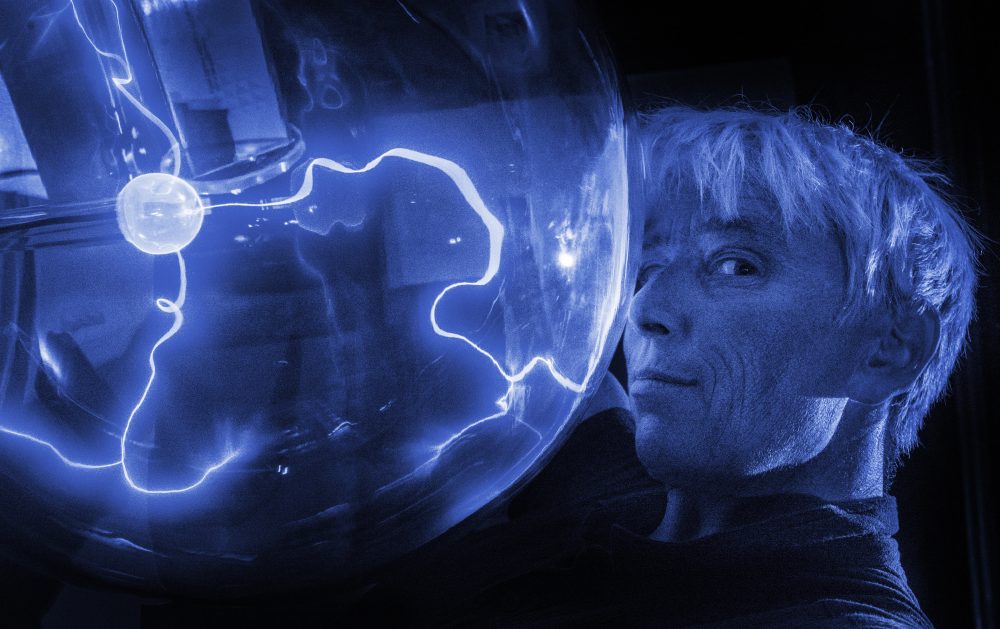
From Hitchhiker to Biker
Trui says she’s always been curious about what’s over the horizon, and she’s hitchhiked all over Europe and Asia. “A motorcycle was just a natural next step. As soon as I learned to ride, I realized I wanted to go on a bigger trip. So in 1999, my girlfriend and I set out on a journey from Belgium to the Himalayas. I took a professional mechanics course, my girlfriend learned to ride. We spent three years preparing. We chose two XT500s with kick starts. We were ill advised – my girlfriend broke her foot because of the kickback, so for some time, I had to kick start both bikes all the time. Eventually the journey ended in Pakistan: I got in an accident, my leg was broken in three places and we just had to call the whole thing off. But the accident turned into a great experience – we got to know the locals in Pakistan, got a better glimpse into the Pakistani society, and three years later, we made the same journey again. This time around, we made it all the way to Ladakh, and it was exhilarating.”
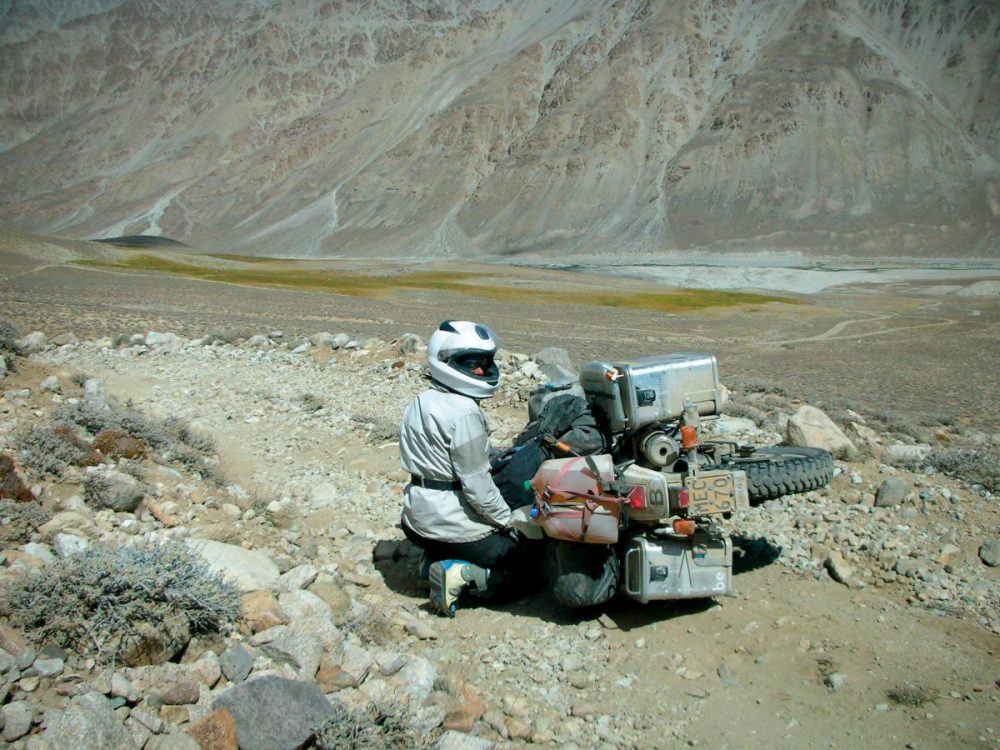
So what’s Trui’s definition of adventure?
“I think real adventure can be anything. It can be a micro-adventure, or it can be huge. People have been riding around the world long before me, doing much more extreme things, on all sorts of bikes. I don’t need my ride to be the longest or the most extreme, or anything like that. And it doesn’t have to be a different country or continent all the time, either. I’ve been to Iran six times now and I’m sure I’ll go back there one day, because revisiting places gives me a deeper understanding of them. I like to go off the beaten track, though, and I avoid places that have been ruined by commercialism and tourism. And again, speaking of the scale of adventure, it can even be found right here in Belgium. For example, I spent a couple of years with the homeless in my hometown of Ghent as a photographer, sometimes sleeping with them on the streets. It was scary and tough at times, but I learned heaps. I’ll also start working with refugees soon, right here in Ghent. The refugee centre is just a couple of streets away from my house, but to me, it’s a completely foreign world. And that’s where the adventure starts: when you step out of your comfort zone and find yourself in a completely new world or situation.” 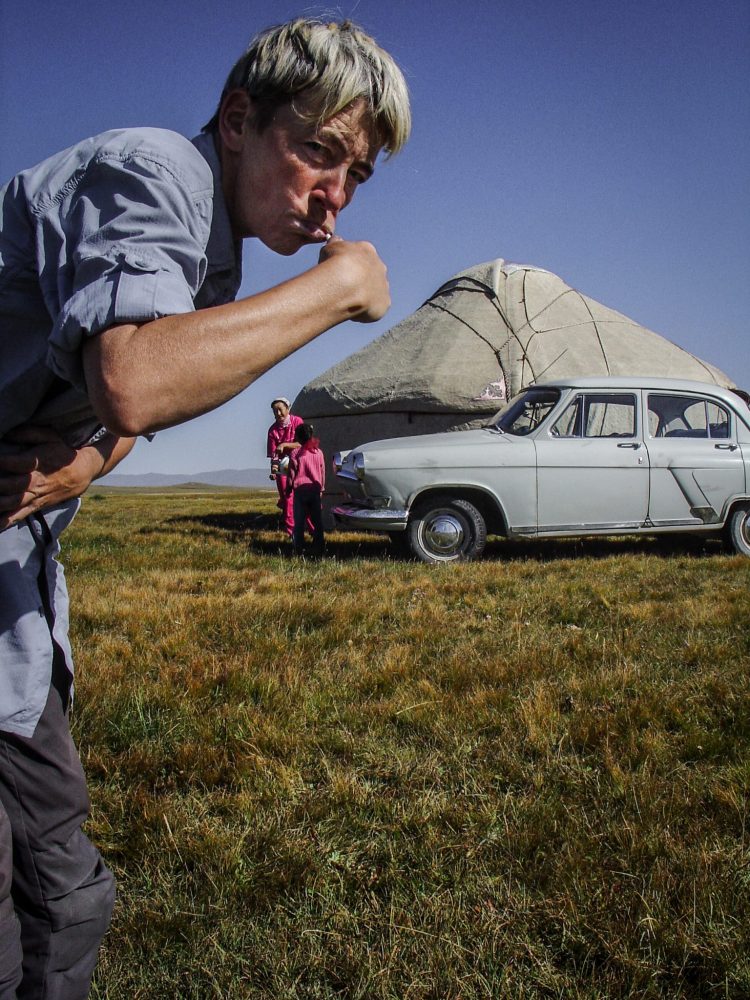
Of Bikes and Women
Trui says that the term ‘adventure riding’ can be both helpful and limiting, and that while the ‘adventure’ part is important, bikes add a whole new dimension to traveling. “I think the label adventure riding gives us access to a network where you find similar people who like similar things. It can also be limiting, because that’s the nature of definitions. But the bike is a very important element, of course. Also, it’s damn cool! And while hitchhiking was great, I hate being stuck without my own transport. I need my freedom. I need to be able to move. A bike also makes you more vulnerable. When you roll into a village on your bike, sure, you’re an outsider, but you have a very direct contact with the people. And that’s very important to me.”
What’s it like to travel as a woman – and a gay woman, no less?
“I’ve always traveled with my girlfriends, so that’s a bit different than what I would probably experience riding solo. I have short hair, and I’m not very feminine, so sometimes I’m even mistaken for a man. Most of the time, we were met with curiosity, sometimes, with suspicion. We always had pictures with fake ‘husbands’, and we wore fake wedding rings. It takes so much effort and so much time to explain that you’re single, or gay, or whatever, so sometimes it’s easier to lie if you don’t want to spend hours explaining. At the same time, if you tell them you’re single, in more traditional societies that might mean that maybe you’re not reliable, maybe you’re a ‘loose woman’ in their eyes, you’re not fitting in at all, and it makes it a lot more difficult to communicate. The difference between what’s normal in Western society and what’s normal in Pakistani society, for example, is so huge that mostly it’s easier to tell a white lie just so you’re less of an alien to them.”
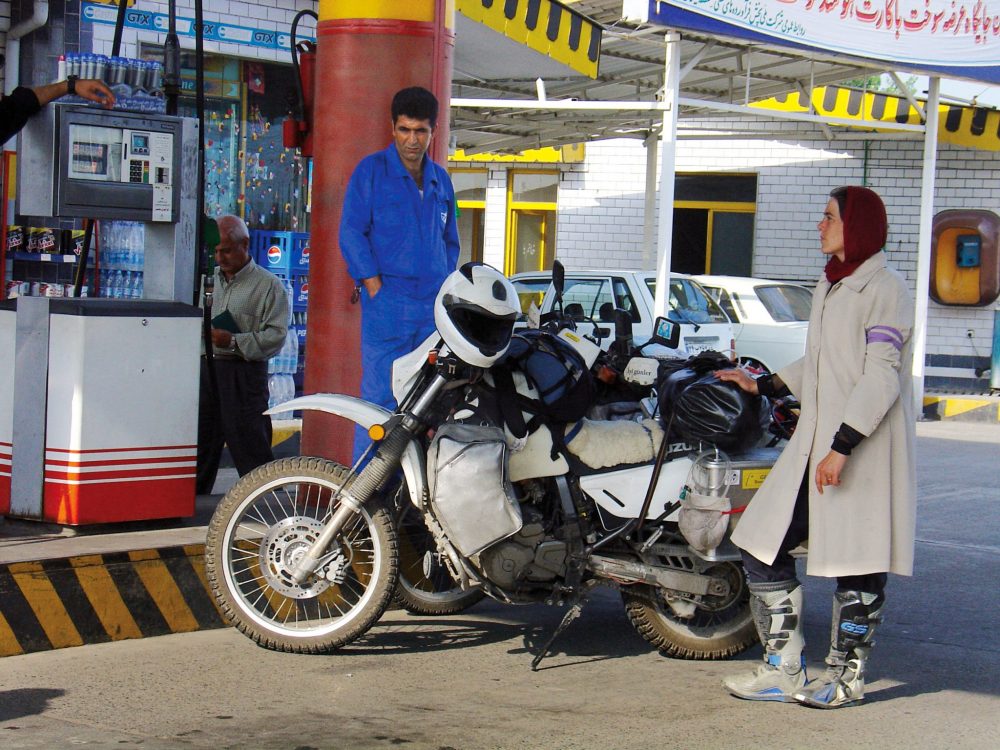
Trui says that most of the time, being female is an advantage; locals are a lot friendlier towards a couple of women on motorcycles.
“When you’re traveling, getting people’s trust as a woman is a lot easier. In a way, you are genderless. In Pakistan, we could talk and dine with men, but we could also chat with the women. We got to glimpse into both worlds, and I’m grateful for that. But you have to be careful as well. In Iran, if you’re gay, you can be kicked out of the country and get into all sorts of trouble. So when my girlfriend and I showed up on bikes, such a possibility never even entered people’s heads – they just naturally assumed we were friends or sisters. It was a logical conclusion to them. Nobody even considered that we might be a couple. And sometimes, even locals have some sort of a façade going on. I know an Iranian film director who’s now over 60. I don’t know for sure that she’s gay- she might not be -but she’s still single. So when she visits Iran, she always invents a story about a husband, children, and grandchildren, just to be on the safe side.”
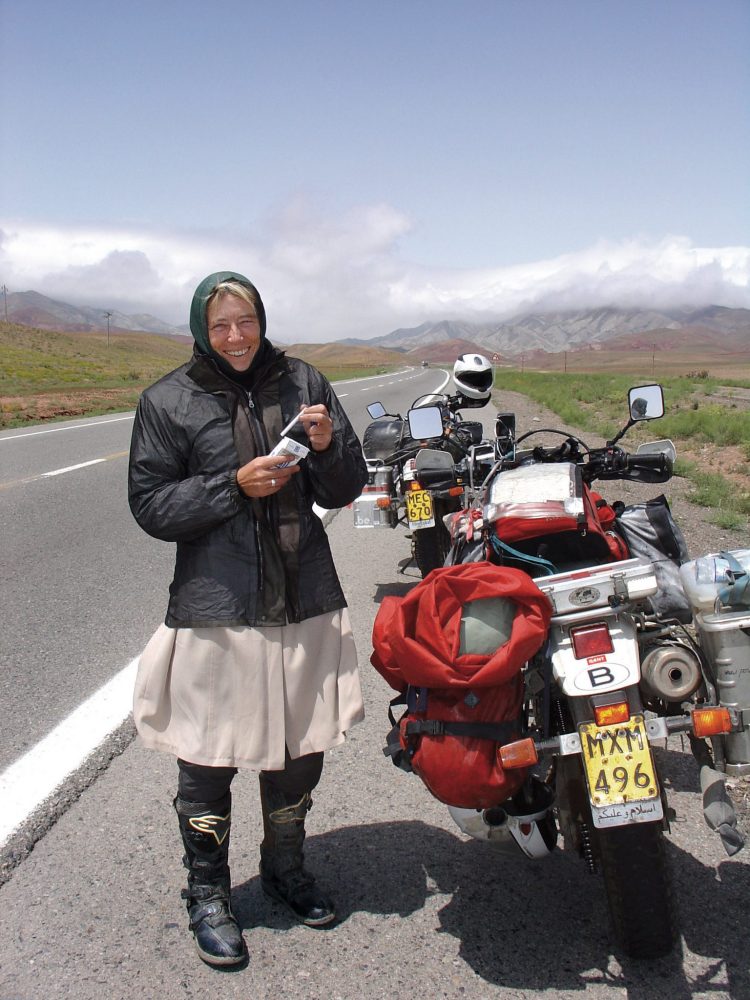
Trui notes that often, you can also become a source of inspiration to the local women.
“Sometimes, you bring people ideas. The very fact that you are there, traveling on your motorcycle without a man is sometimes enough. You sow ideas. You see the sparkle in girls’ eyes. I’d love to visit schools and do talks. I don’t want to portray myself as a hero, though, not at all. I just want to show how easy it is. Even if girls and women simply buy a bicycle and go around their province, that’s already great. If they just step out of their comfort zone, that’s already an achievement. And I want to share that.”
Is it ever dangerous? Trui claims some places can be a little intimidating, but she says she’s never run into any serious trouble.
“In Yemen in 2007, we hardly saw any women. If there were women in the streets, their faces were completely covered, and it gave us this uneasy feeling. Should we cover up completely, too? But the locals didn’t mind us at all. They were very curious, though, and they couldn’t believe we got to Yemen on our bikes. In Iran in 1999, there were still a lot of morality police on the street, which was really spooky. Most of the time they were just intimidating and condescending, though. It was very unpleasant but we never got into real trouble. In 2007 and 2014, it was already very different, and the atmosphere felt much better.”
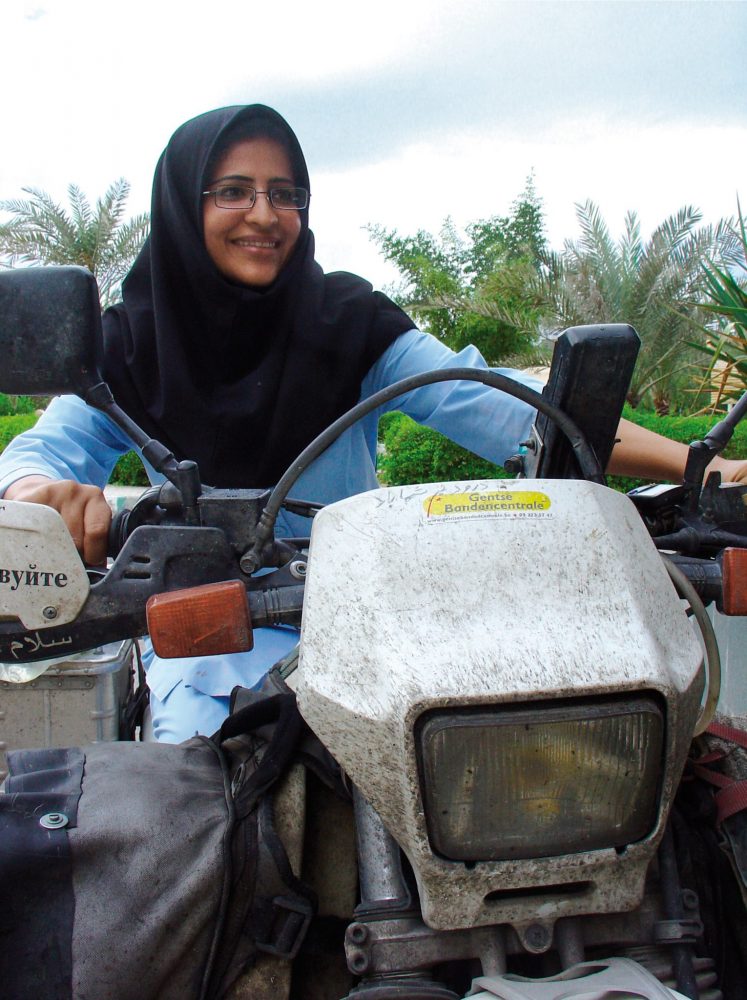
Going Electric
Trui comes off as a philosopher, but of the playful punk kind, so it’s no surprise that she’s blazing a new trail – and doing it in style. Currently, she’s been obsessed with a brand new toy, an electric Zero DS bike. She’s ridden it to Istanbul and back just to prove a point, and she’s now taking the whole European continent by storm under her alias, Elektrogirl.
“I’m always very curious about new things, new technology, and I’m always test riding new bikes. So when I saw an ad to test ride an electric bike, I went to see it. I thought it was going to be slow, boring and awkward. How can a bike be exciting if it has no gears? But as I rode off, it felt like I was piloting an airplane. I’ve never experienced anything like that before, not even on race bikes! I was intrigued. Another startling and wonderful thing about it was the complete silence. I could have a conversation with my girlfriend going at 40mph (60km/h), and could hear the birds and the trees. And there’s no maintenance at all – forget about oil changes, burnt clutches, and overheating engines. And finally, it’s dirt cheap to run. You can do over 150 miles (250km) on full charge, which costs you about $3. The whole journey from Belgium to Istanbul on the Zero DS cost me $24. And because electric bikes are such a novelty, people didn’t mind me charging it for free everywhere I went: restaurants, farms, people’s apartments. Someone loaned me the bike, and they’re really expensive. Otherwise, I would love to own one.”
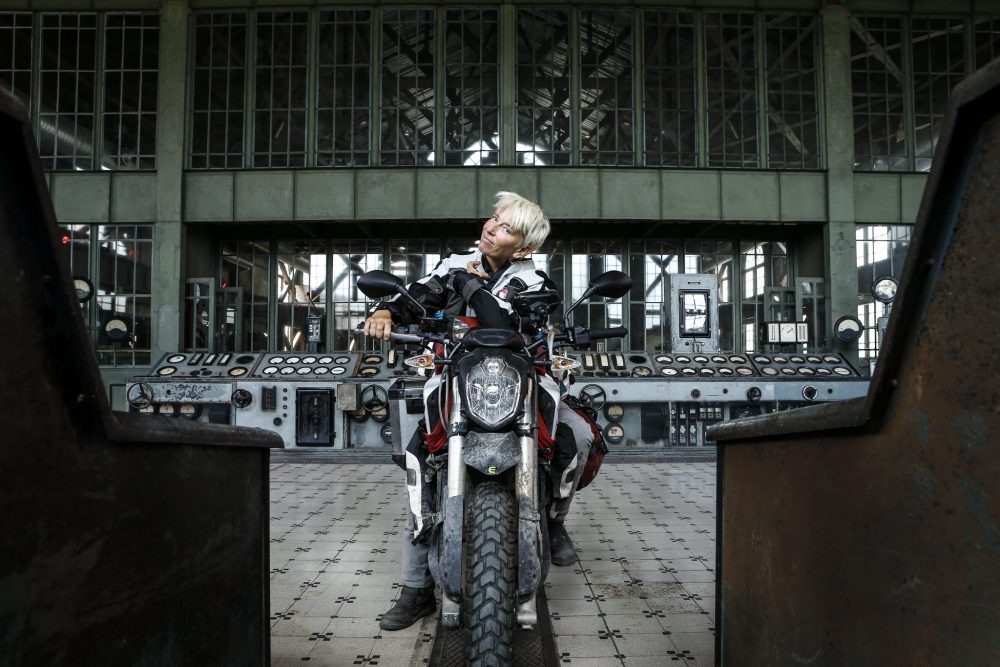
Trui says that the price of a new Zero DS bike is around 20% higher than that of regular bikes, and the full charge range – 155 miles (around 250km) – is simply too short. Additionally, finding a place to charge the bike could be very difficult in places like Central Asia or Africa. And finally, the weight of the Zero DS is nearly 460 pounds (208 kg), which is too heavy for serious adventure riding – but Trui claims it’s still a great option for light adventuring.
‘There’s lots that needs to be improved, and there needs to be an open discussion about where the lithium for the batteries comes from. But I do think the electric bike could have a future, and my round trip from Ghent to Istanbul proves that it’s suitable for travel. I’m hoping the electric bike gets more visible in the future-it’s already turning heads around here in Belgium. I remember people’s faces full of disbelief during the Electric Night Ride event: imagine a gang of bikers stopped at the red light…and making absolutely no noise at all! People even came out of restaurants and cafes to look at us. I think it’s amazing that bike designers are taking risks with creativity. And yes, traveling on an electric bike is slower, because you need to stop more often to charge it. But I think we need more slowness in our lives. I’ve seen people racing to India and getting there in three weeks. I just don’t see the point in that. To me, traveling is a lot about getting lost, improvising, and finding myself in the strangest situations.”
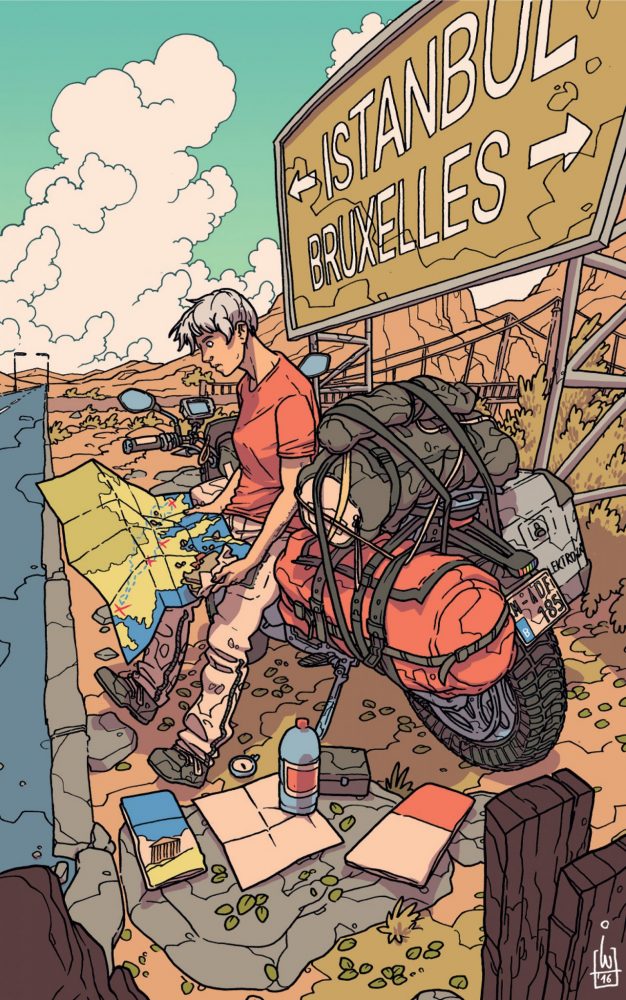
Trui hopes to set out on a long overland journey on the electric bike by 2018 or 2019. In the meantime, she’s busy with her studies, her art, and her creative adventures: she organizes the Electric Night Ride which she hopes will become a worldwide event, and blogs about her Elektrogirl experiences in Belgium and abroad.
FOLLOW TRUI’S ADVENTURES: ELEKTROGIRL
[Best_Wordpress_Gallery id=”26″ gal_title=”Trui”]

3 comments
Great article and photos!! Really inspiring stuff.
Interesting article good pictures, thanks.
Really enjoyed reading this. Interesting comments about the electric bike, weight, limitations etc and yes, we do need to think about where the materials come from. Inspiring.